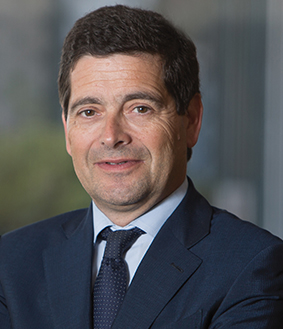One of Novo Banco’s problems, says chief executive António Ramalho, is high costs. To compete successfully in Iberia, he says, lenders need cost-to-income ratios close to those of the most competitive Spanish banks.
Novo Banco, he acknowledges, is some way off that degree of efficiency, with a cost-to-income ratio of 67%. So too are most other banks in Portugal, where the average cost ratio of about 60% leaves lenders lagging behind their more efficient Spanish peers and closer to the high cost levels of some German banks.
Cutting costs is just one of the challenges Mr Ramalho faced when he was appointed CEO of Novo Banco in August 2016, two years after it was created out of the ashes of Banco Espírito Santo (BES). Designated as a ‘transition bank’, Novo Banco was born out of a €4.9bn bailout designed to save BES’s healthy assets from destruction by the collapse of the Espírito Santo business empire.
“The year of 2017 will be the last year of our transition and the search for a new shareholder following a transformation in our cost structure and a significant increase in our capital strength,” says Mr Ramalho. He has had a long career in banking and finance and was chairman of Infrastruturas de Portugal, a state-owned company managing road and rail infrastructures with net assets of €27bn.
Cause for optimism
Non-listed Novo Banco, Portugal’s third largest lender, with a market share of about 15%, is jointly owned by all of Portugal’s banks through the country’s bank resolution fund. Quarterly losses since it was founded have averaged €250m. About one-quarter of its loan portfolio is non-performing or ‘at risk’.
In February, US private equity fund Lone Star entered ‘concluding talks’ with Bank of Portugal on becoming the bank’s controlling shareholder, announcing that it intended to retain the current management team led by Mr Ramalho. “We are deeply optimistic about Portugal,” said Olivier Brahin, Lone Star’s president for Europe.
Mr Ramalho has defined three priorities: liquidity, capital and deleveraging. “We have succeeded in increasing our liquidity coverage ratio to almost 100%, above regulatory requirements,” he says. “We have brought down our loans-to-deposits ratio from 180% to about 110% and repaid €3.5bn in governmental guarantee bonds. We have also achieved a core Tier 1 [capital] ratio of 12% in line with regulatory requirements.”
Deleveraging, a crucial issue for Portuguese banks, firms and families in recent years, is also a pressing priority for Novo Banco. “We have recognised impairments totalling about €5bn since 2014, which has considerably strengthened our balance sheet for the future,” says Mr Ramalho.
Dealing with the past
A heavy legacy of non-performing loans (NPLs) means risk costs are high, however. “Our regular cost of risk is below 70 basis points, but when legacy NPLs are taken into account it soars above 175 points,” says Mr Ramalho. Provisioning in the first nine months of 2016 totalled €762m, up two-thirds year on year. Coverage of bad debts stands at more than 60%.
While BES’s toxic assets were hived off into a ‘bad bank’, Novo Banco has created a ‘side bank’, representing the non-core side of a conceptual division of assets into strategic and non-strategic. “Our side bank consists of international holdings, non-strategic loans, restructuring funds and real estate,” says Mr Ramalho. “In 2016, we reduced the value of side bank assets from €10.4bn to €8.9bn through impairments and disposals, including €500m in real estate sales.”
The ultimate aim is to cut back the side bank “to a size where it doesn’t affect our normal performance”, he says. “This means shrinking it to assets worth €4bn to €5bn, representing 10% to 12% of our total assets.”
Novo Banco, says Mr Ramalho, is determined “to preserve the positive side of what we have inherited from BES as Portugal’s leading bank for small and medium-sized firms, which account for two-thirds of our assets”.
But it will differ markedly from the old bank, he says, by “focusing solely on banking” as a professional market-based lender rather than a family bank, with “a total commitment to transparency and good governance to meet the challenges ahead”.












